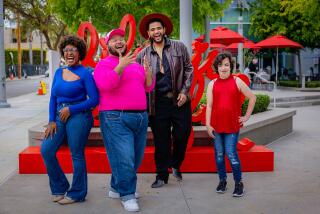A Personal Look at Gaysâ Quest for Spiritual Identity
In his new book, âComing Out Spiritually: The Next Step,â author Christian de la Huerta writes about how wrenching it was to confess his homosexuality to his parents. It was, he writes, equally difficult for him to reconcile the conservative dogma of his lifelong faith--Catholicism--with being out of the closet.
âComing out is a profoundly spiritual act,â he writes.
The topic of the relations between gays and Catholicism has been in the spotlight in recent weeks because of the Popeâs decision to ask a Maryland-based priest and nun to permanently halt their 30-year ministry to the Catholic gay community. The ministry, Vatican officials argued, had strayed from Catholic teachings about licit and illicit sexual relationships.
At the root of that dispute is an issue that de la Huerta grappled with as he grew up: Can a person be both gay and Catholic?
De la Huerta decided that he could not, and he spent a decade forging a patchwork spirituality for himself, weaving together rituals from myriad religions. He keeps a Virgin Mary candle on a makeshift altar in his home alongside rocks, a wrought-iron Byzantine cross and a sculpture of Ganesh, the Hindu elephant deity.
De la Huertaâs search for an accepting spiritual community inspired him to found a San Francisco-based nondenominational organization called Q-Spirit.
De la Huerta grapples with whether gays and lesbians should work within religious organizations and fight homophobia or abandon them altogether and immerse themselves in alternative spirituality--including yoga, qi gong, tai chi, ritual dance or labyrinth walking.
âSome gay people wonder why any self-respecting queer would wish to stay within the confines of organized religions that refuse to acknowledge us and have so often let us down,â he writes.
In the end, de la Huerta argues that homosexuality and spirituality--including organized religion--donât need to be mutually exclusive.
Unfortunately, the bookâs execution is as muddled as de la Huertaâs spiritual search.
De la Huerta, 40, was born in Cuba and grew up immersed in Catholicism. As an altar boy, he used to take the thick red cloaks home and act like he was a priest, pretending to preside over a communion table and confessional booth with his nine siblings.
His book might have been more effective as a full-fledged memoir about the spiritual evolution that began with those youthful experiences. Instead, with first-person observations and anecdotes randomly wedged into the copy, the book straddles genres. The chapters--including one on healthy sexuality and the importance of coming out--are a mishmash of research into world religions and alternative spirituality. It reads more like a chockablock term paper, crammed with facts and quotes.
The failures are many. First, de la Huertaâs unabashed male perspective excludes the lesbian experience. Second, his efforts to canvas all religions make his writing quite choppy, with quotes and examples stuck helter-skelter throughout the chapters.
The book is also riddled with stereotypes about gays and lesbians, with tired attempts at humor, like âgay people throw the best parties and have the best dance clubs.â
Despite its shortcomings, the book is worth reading--if only for the extensive appendixes, including an exhaustive list of national organizations for gays and lesbians, with little-known groups like the National Conference for Catholic Lesbians, Gay Muslims and the Gay Buddhist Fellowship.
Most impressive is the âQuick Guide to the Worldâs Spiritual Traditions for Queer Seekers,â in which de la Huerta surveys the degree of homosexual acceptance within Hinduism, Buddhism, Taoism, Judaism, Islam, Christianity, Roman Catholicism and Protestantism.
Heâs also cobbled together a list of retreat centers, regional organizations, seminars, books, journals, magazines and Web sites to assist gays and lesbians in their spiritual search.
He ends the book with battle cry for a âlavender waveâ of consciousness.
âThere is a spiritual awakening happening in this country, and all over this world. We can support it by coming out of the spiritual closet, by acknowledging that it is taking place, by talking about it to our friends and co-workers, by being an active, conscious part of this phenomenon that is sweeping the world.â
Elaine Gale covers religion for The Timesâ Orange County edition.
More to Read
Sign up for our Book Club newsletter
Get the latest news, events and more from the Los Angeles Times Book Club, and help us get L.A. reading and talking.
You may occasionally receive promotional content from the Los Angeles Times.








